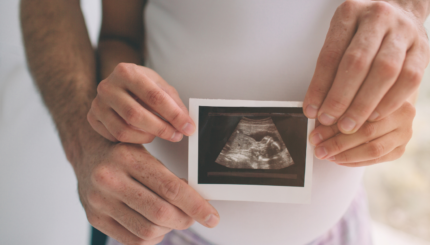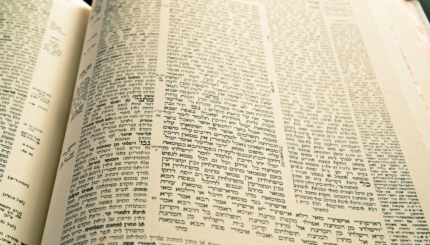The Passover
often serves as a model for new rituals. The author calls the following a Seder Lichvod Yetzi’at Meitzarim, which translates to a Seder in Honor of Going Out of Narrow Places. As liberal Judaism has come increasingly to accept gays, lesbians, bisexuals, and transsexuals, ceremonies like this one have been devised to religiously commemorate a life passage not addressed by traditional rites: publicly “coming out of the closet.” Traditional Judaism, which condemns homosexual behavior, would obviously not condone a ceremony like this one. It is reprinted with permission from the author.
The community sings together:
Nigun [melody] familiar to the community
Leader:

Help us keep Jewish knowledge accessible to millions of people around the world.
Your donation to My Jewish Learning fuels endless journeys of Jewish discovery. With your help, My Jewish Learning can continue to provide nonstop opportunities for learning, connection and growth.
“As the Israelites sang at the sea, so should the Jewish community sing when any one of us chooses to liberate him or herself from old enslavements.” — Rebecca Alpert.
Reader:
V’ha’aretz hayta tohu vavohu, v’choshech al p’nei t’hom… (Breishit 1:2).
And the earth was without form and void; and darkness was on the face of the deep… (Genesis 1:2).
Reader:
Let us bring order into a disordered world.
Seder means “order.” Traditionally, we use the term to refer to the Passover meal that commemorates when the children of Israel were freed from bondage in [Egypt]–“the narrow place.” Seder reminds us that there are many rituals to be followed, many prayers and blessings to be recited, stories to be told, and songs to be sung, before the Passover is complete. During Pesach, we follow the “order” of the service in the Haggadah, which leads us through slavery, to freedom, and urges us to dream beyond–to the final redemption and perfection of the world.
Tonight, we also conduct a seder, commemorating the “coming out” of another narrow place–the closet of gay, lesbian, bisexual, and transgender secrecy and shame that is often so necessary in a world that lacks understanding and courage. Our seder is a defiant act; order and freedom in the face of disorder and injustice.
Reader:
Tonight we gather for a coming-out seder. Some of us are here tonight, because, recently, we have come to recognize something new about who we are and about whom we love. Like our people’s exodus from the shackles of Mitzrayim–rendering us a free people–we have made an exodus from the shame and fear of the “closet.” We have nothing to hide as we move toward a land of greater promise. This world is still so far from full acceptance and support of gay, bisexual, lesbian, and transgender people, but we look to the warm faces around this seder table as a vision of a future world in which everyone can be safe and free.
Reader:
Some of us are here tonight, because we want to envision a world of justice for all people, regardless of race, age, class, ability, gender, or sexual orientation. We are here because we are part of a family, community, or society in which so many are still not free from the “Mitzrayims” of our world. We are here tonight to say that we want to be part of that vision, and we want to help make that vision a reality. We want those amongst us who mark their “coming out” tonight to know that we affirm their honesty and bravery, and we accept the honor they bestow upon us by sharing this moment of transition with us.
Sh’ma Koleinu, Hear Our Voice, O God!
The community reads responsively:
Our people have always sent our pleas heavenward, beseeching the Holy One to hear our prayers of longing, hope, thanksgiving, and praise.
But what do we tell our children who do not know their own voices?
We tell them to sing from their hearts.
We tell them to find the holy prayers within.
But what of the child who knows not how to sing?
What of the child whose prayers do not yet have words in this world?
We are all these children
We are a community.
What of the child whose melody ambles outside the sanctuary and hovers, looking on the service from afar?
What of the child whose voice speaks in the syntax of a different world?
We are all these children
We are a community when we can all beseech, Sh’ma Koleinu.
We are a community of voices, when each of us can speak the truths of our hearts.
Wine–Our Symbol of Joy
The community reads responsively:
Our people’s tale is one of freedom, revelation, and the hope and work for final redemption, when all the world will be whole.
But, the final redemption is still but a dream.
Tonight’s story begins with the first moments of freedom. God promised:
V’hotzeiti etchem mitachat sivlot Mitzrayim (Shemot 6:6).
And I will free you from the burdens of Mitzrayim (Exodus 6:6).
Tonight we drink four cups of wine to mark our redemption from the slavery of the closet. With each cup we move from the narrow strictures of hiding places to our vision of a better world.
Tonight, as a community, we courageously cross the sea of silence. We affirm the truths of the gay, lesbian, bisexual, and transgender members in our midst who bravely come out to us and to themselves. God in Her mysterious guises, God through the hands of this supportive gathering, fulfills the promise tonight to free us all from the burden of our narrowness.
We thus invoke the promise of the first cup and recite together, raising the cup of wine:
N’varekh et ein ha-chayim, matzmichat p’ri ha-gefen.
Let us bless the source of life that ripens fruit on the vine.
Everyone drinks from the first cup.
These are our stories.
At this point in the ceremony, participants may choose to share their own stories, readings, or divrei [words of] explicating the meanings of coming out for each of them. The group may choose to reserve this honor specifically for participants who are coming out during this ritual. As those who come out tell their stories, they may choose to recite the following, recognizing this moment of transition in their lives and in the life of the whole community:
The community reads responsively:
We are a people descended from fiery prophets.
We hear their cry for justice.
Our mothers nursed their faith in the God of many facets.
Our mothers met each day anew in Her eyes.
Our fathers bent their hearts to new wisdoms.
Our fathers felt a changing world howl its greatness in their bosom.
We are children of joy and visions.
We ever renew the world toward wholeness.
We are young and old, rich and poor.
We are lesbian, gay, straight, and bisexual.
We are men and women.
We are transgender.
We are wise and untutored.
We are creative and present in our bodies.
Let us, all of us together, cradle Torah in our hearts.
Let us learn to walk its paths toward a better world.
A world only envisioned,
A world in which all are free,
All act on mercy,
And all is just.
Leader blesses those coming out:
Transliteration:
Mi She-beirakh imoteinu Sarah, Rivka, Leah v’Rachel, Bilhah v’ Zilpah, Miriam v’Rut, v’avoteinu, Avraham, Yitzchak, v’Ya’acov, Moshe, v’David, Hi t’varekh et
May the One who blessed our Mothers, Sarah, Rebecca, Leah and Rachel, Bilha and Zilpah, Miriam and Ruth, and our fathers, Abraham, Isaac, and Jacob, Moses, Aaron and David, bless
______ bat __________ she ba’ah l’fanenu b’ometz lev l’hakhriz al ha-z’hut ha’lesbit shelah
_____ daughter of _____ who comes before us with courage to declare her lesbian identity
_______ ben __________ she bah l’fanenu b’ometz lev l’hakhriz al ha-z’hut ha homsexualit shelo
_____ son of _____ who comes before us with courage to declare his homosexual identity
_______ bat __________ she ba’ah l’fanenu b’ometz lev l’hakhriz al ha’z’hut ha bisexualit shelah
_____ daughter of _____ who comes before us with courage to declare her bisexual identity
________ ben___________she bah l’fanenu b’ometz lev l’hakhriz al ha-z’hut ha bisexualit shelo
_____ son of _____ who comes before us with courage to declare his bisexual identity
__________ bat __________ she ba’ah l’fanenu b’ometz lev l’hakhriz al ha-z’hut ha transexualit shelah
_____ son of _____ who comes before us with courage to declare her transsexual identity
_________ ben ___________ she-bah l’fanenu b’ometz lev l’hakhriz al ha-z’hut ha-transexualit shelo
_____ son of _____ who comes before us with courage to declare his transsexual identity
(Repeat appropriate line for each participant)
b’toch ha-kehillah ha-zot
in the midst of this community.
For a man: Yigdal–May he grow
For a woman: Tigdal–May she grow
For group: Yigd’lu–May they grow
B’havanah atzmit–in self-understanding
For a man: Yismach–May he rejoice
For a woman: Tismach–May she rejoice
For group: Yism’chu–May they rejoice
Ba-zeihut he-chadash/ ba-z’huyot ha-chadashot–in the new identity/identities
For a man: she-hu matzhir –he affirms
For a woman: she-hi matzhirah–she affirms
For group of men: she-hem matzhirim–they affirm
For group of women: she-hen matzhirot–they affirm
Hayom–today.
She-ne’emar: Vayizaku el- ba’tzar la-hem mimtzukoteihem yoshi-em (Psalms 107:13)– As it is written: They cried to the Holy one from their narrow places, and God saved them from their distresses (Psalms 107:13).
For a man: Ha-g’vurah shelo t’hiyeh–May his strength be
For a woman: Ha-g’vurah shela t’hiyeh–May her strength be
For group of men: Ha-g’vurah shelahem t’hiyeh–May their strength be
For group of women: Ha-g’vurah shelahen t’hiyeh–May their strength be
L’dugmah u’l’mofeit l’chol yoshvei tevel she’mitgagayim l’sof hester panim b’tokh libeinu u’l’pidyon nafsheinu bimheirah b’yameinu.
a shining example to all who yearn for an end of the hiding of God’s face in our hearts and yearn for the redemption of our souls, soon, in our days.
For a man: Y’kabel–May he receive
For a woman: T’kabel–May she receive
For a group: Y’kablu–May they receive
Ahavah, chamimut, u’t’mikhah m’ha-kehillah ha-zot,
love, warmth and support from this community
For a man: m’mispachto u’m’chaverav–from his family and from his friends
For a woman: m’mishpachtah u’m’ chavereiha–from her family and from her friends
For group of men: m’mishpachteihem u’m’chavereihem–from their families and from their friends
For a group of women: m’mishpachteihen u’m’chavereihen–from their families and from their friends
Ha-ma’aseh ha-zeh (Ha-Ma’asim ha’eleh) latzeit min ha-metzarim y’orer / y’or’ru banu ruach chadashah (Ezekiel 36:26) la’avod b’yeter s’eit likrat hayom, hayom k’she-anashim homosexualim, lesbiot, anashim v’nashim bisexualim, v’anashim v’nashim transexualim lo yisb’lu od m’sin’ah, midei’ot k’dumot u’min-ha-haflaya, hayom k’she-kol am Yisrael y’chiyu k’mo am echad, v’chol yoshvei tevel y’chiyu b’shalom u’b’shleimut. Amen.
May this act (these acts) of coming out inspire us to work more diligently towards the day when gay men, lesbians, bisexual people, and transgender people will not suffer from hatred, prejudice, and discrimination, when all of Israel will live as one people and all who dwell on earth will live in peace and wholeness. Amen.
Bayom Ha-Hu
Bayom hahu y’hiyeh Adonai echad u’shmo echad.
On that day, God shall be one and God’s name shall be one.
-or-
Gesher Tzar M’od
All the world is a narrow bridge.
And the essence of living is not to be afraid.


